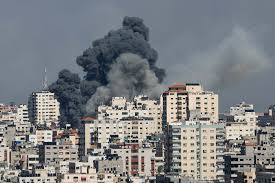Military described the strike as hitting significant Hamas terrorists who were operating within a command-and-control centre.
NEW DELHI: An Israeli strike on an area in the Gaza Strip home to Palestinians displaced by the Israel-Hamas war killed at least 40 people and wounded 60 others, authorities said. The Palestinian news agency WAFA reported the toll for the strike, citing medical officials, and suggested the figures could change.
Details about the strike in the Mawasi coastal community just west of Khan Younis that the Israeli military has designated as a humanitarian zone remained unclear. The area is home to many Palestinians displaced by the Israel-Hamas war in which the Israeli military has devastated the wider Gaza Strip after Hamas’ October 7 attack on Israel.
The Israeli military described the strike as hitting “significant Hamas terrorists who were operating within a command-and-control centre,” without immediately providing additional evidence.
Hamas in a reported statement denied that, though Israel long has accused Hamas and other militants of hiding in civilian populations. Israel has launched strikes in and around Mawasi in the past, even as hundreds of thousands of Palestinians now live there.
Footage circulating on social media showed deep craters at the site of the attack, the strewn ruins around it covered in shredded tents, a bicycle and other debris. Rescue workers used shovels to shift through the sand.
Bystanders used their hands to dig, illuminated by mobile phone light. At least one crater at the site looked to be as deep as 10 metres.
The Israeli military said it used “precise munitions, aerial surveillance and additional means” it did not immediately describe to limit civilian casualties. Mawasi is an area 1 kilometre wide and 14 kilometres long.
Palestinians who fled other areas have crowded into the sandy beach area against the Mediterranean Sea after Israel told them it would be safe. However, aid groups have struggled to provide care there among a sea of tents crowded with the belongings families were able to carry away with them when fleeing their homes.


